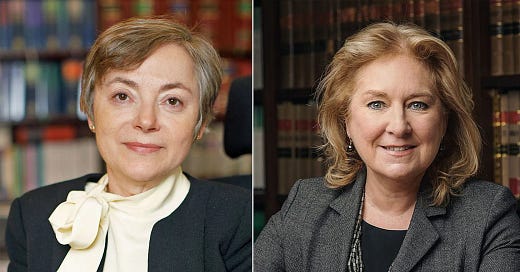Who will be the next chief justice of England and Wales? Around the inns of court these days, they speak of little else. But anyone who knows isn’t telling. Perhaps the final decision has not yet been taken.
It’s widely believed that only two candidates were interviewed by a selection panel on 21 April. As I suggested nearly four months ago, they were Dame Victoria Sharp and Dame Sue Carr. Sharp is president of the King’s Bench division of the High Court, effectively the chief justice’s deputy on the criminal side. Carr is a lady justice of appeal and former vice-chair of the Judicial Appointments Commission.
Ultimately, the decision is one for the justice secretary and lord chancellor, Alex Chalk KC MP, who will be sworn in later today. But the person he advises the King to appoint must first have been selected by the panel.
It comprised:
Helen Pitcher OBE, lay chair of the Judicial Appointments Commission
Lord Lloyd-Jones, as the most senior justice of the Supreme Court to have served in the judiciary of England and Wales
Sue Hoyle OBE, lay member of the Judicial Appointments Commission
Sarah Lee, solicitor member of the Judicial Appointments Commission
Lord Justice Edis, the senior presiding judge, who was designated as a member of the panel by the lord chief justice
The panel was required to select one candidate and send a report to the lord chancellor.
It would be surprising if Chalk had rejected the panel’s selection and I have no reason to suppose that this has happened. The lord chancellor would want to consider the panel’s report carefully, consult those who know the candidates and perhaps seek further information. An announcement was never expected before June.
But readers may be interested in the lord chancellor’s options. These are set out in complicated regulations which I will do my best to simplify. Their aim is clearly to limit the lord chancellor’s veto powers and promote compromise in the event of a disagreement.
Keep reading with a 7-day free trial
Subscribe to A Lawyer Writes to keep reading this post and get 7 days of free access to the full post archives.




